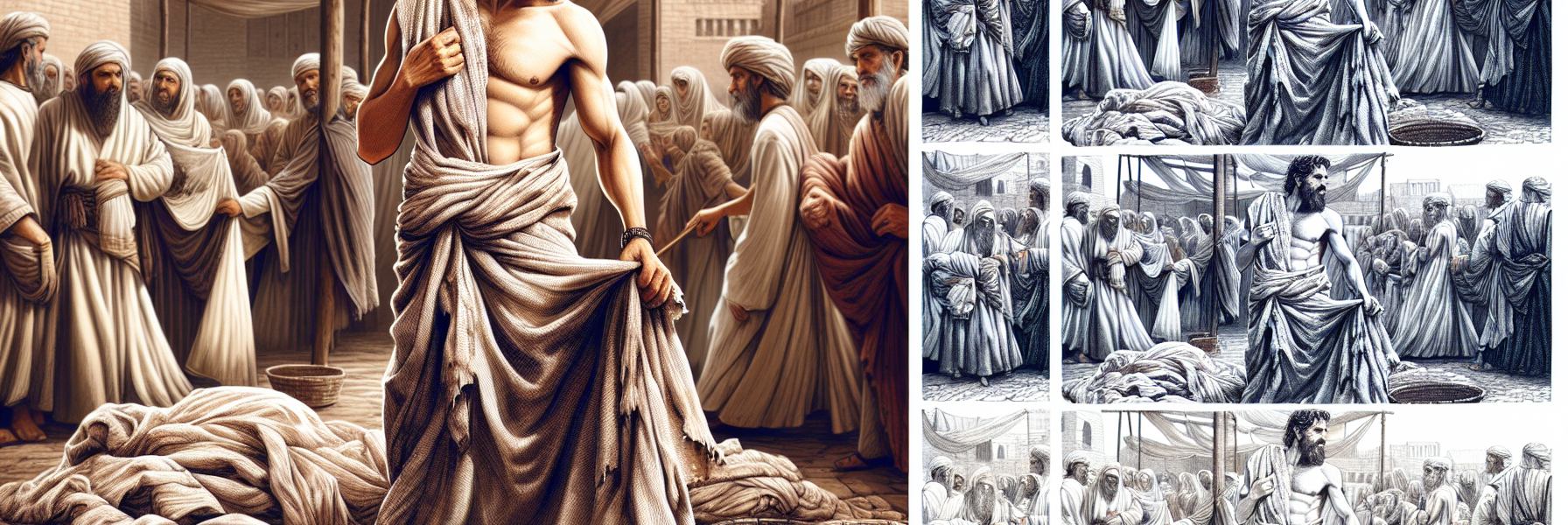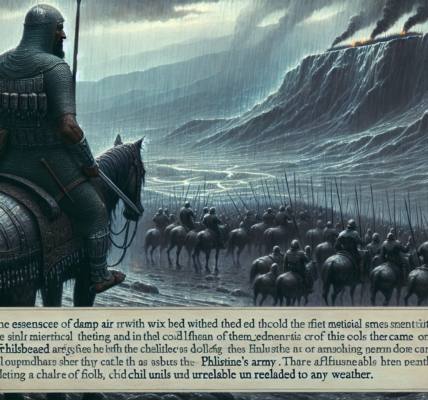**The Ruined Loincloth: A Prophetic Warning**
In the days when King Jehoiakim ruled over Judah, the word of the Lord came to Jeremiah the prophet with a strange and solemn command. The Lord said, *”Go and buy a linen loincloth and put it around your waist, but do not dip it in water.”*
Jeremiah obeyed without hesitation. He went to the marketplace of Jerusalem, where merchants displayed fine linens from Egypt, woven with care and dyed in rich hues. Selecting a sturdy yet plain loincloth—a garment worn close to the body, a symbol of intimate belonging—he wrapped it around his waist as the Lord had instructed. The linen clung to him, a reminder of how closely God had bound Israel to Himself.
Days passed, and the loincloth remained unwashed, absorbing the dust of the streets and the sweat of Jeremiah’s labor. Then the Lord spoke again: *”Take the loincloth that you are wearing, and go to the Euphrates, and hide it there in a cleft of the rock.”*
Jeremiah’s heart must have stirred at the command. The journey to the Euphrates was long—a trek of hundreds of miles through rugged terrain, a path that mirrored the exile Israel would soon face. Yet the prophet did not waver. He walked under the scorching sun, through valleys and over hills, until he reached the great river, its waters rushing with the strength of empires. There, in the shadow of Babylonian power, he tucked the loincloth into a crevice among the rocks, burying it like a hidden shame.
Many days later, after Jeremiah had returned to Jerusalem, the Lord spoke once more: *”Go again to the Euphrates and take the loincloth from there.”*
So Jeremiah made the arduous journey a second time, his sandals worn thin from the road. When he reached the riverbank and pried the linen from its hiding place, his hands touched something ruined—rotted by moisture, stiff with filth, good for nothing. The once-pure garment, meant to cling in faithfulness, had become a defiled rag, useless and decayed.
Then the word of the Lord thundered in Jeremiah’s spirit:
*”Thus says the Lord: Even so will I ruin the pride of Judah and the great pride of Jerusalem. This evil people, who refuse to hear My words, who stubbornly follow their own hearts and go after other gods to serve and worship them, shall become like this loincloth, which is good for nothing. For as the loincloth clings to a man’s waist, so I made the whole house of Israel and the whole house of Judah cling to Me, declares the Lord, that they might be My people, for renown, for praise, and for glory. But they would not listen.”*
Jeremiah’s chest tightened as the weight of the prophecy pressed upon him. He saw in his hands the fate of his nation—once chosen, now corrupted. The people had been set apart, bound to God in covenant, yet they had soiled themselves with idolatry, greed, and injustice. Like the loincloth left to rot, they had become worthless in their rebellion.
Returning to Jerusalem, Jeremiah stood in the temple courts and proclaimed the Lord’s warning. His voice echoed off the stones as priests and merchants paused to listen:
*”Hear this, O foolish and senseless people, who have eyes but see not, who have ears but hear not! Will you not tremble before Me? The Lord has given you this land, yet you defile it with your sins. You bow to Baal and Asherah, you cheat the poor, you shed innocent blood—and still you come before Him with empty sacrifices, as if He does not see!”*
Some scoffed, turning away. Others clenched their fists, resenting the prophet’s words. But Jeremiah continued, his voice raw with grief:
*”If you will not listen, if you will not take these words to heart, then like this ruined loincloth, so shall you be ruined. The armies of the north will come, and you will be carried into exile, far from this land. Then you will know that it is I, the Lord, who spoke—not to destroy you without cause, but because you have forsaken Me.”*
Yet even in judgment, the heart of God ached. As Jeremiah held up the rotted linen for all to see, the Lord’s mercy lingered beneath the warning. For He does not delight in punishment but in repentance. If only they would turn back—if only they would cling to Him once more.
But the people hardened their hearts. And so, like the loincloth hidden by the river, they too would be taken far from home, left to face the consequences of their pride—until the day they remembered the God who had once bound them so closely to Himself.
And Jeremiah, the weeping prophet, mourned for the ruin that would surely come.




